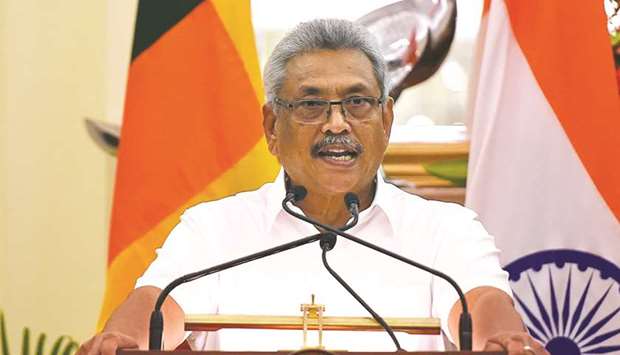Millions of workers staged a crippling strike in Sri Lanka yesterday, adding to pressure on President Gotabaya Rajapaksa and his ruling family to quit over the country’s worst-ever economic crisis.
The island nation of 22mn people has been hit by months of acute shortages of food, fuel and medicines, prompting widespread protests.
But yesterday’s nationwide strike was the first time the entire country had been brought to a standstill since the demonstrations began, with both state and private sector employees taking part. Public transport was stopped, teachers quit school while shops and offices closed, police and regional officials said.
Rajapaksa has invited leaders of his party to discuss the crisis today, but former coalition partner the Sri Lanka Freedom Party (SLFP) said they will not attend and instead told him to step down.
Prime Minister Mahinda Rajapaksa, Gotabaya’s elder brother and a former two-term president, has said he is confident he will not be fired over the crisis.
In Colombo’s main commercial area of Pettah, wholesale trading shops were shut and workers joined a march chanting: “Go home Gota. Go home Gota,” referring to the president.
More than 100 trade unions, some even affiliated with the Rajapaksas’ ruling Sri Lanka Podujana Peramuna (SLPP) party, joined the general strike, demanding the president, prime minister and other senior officials resign.
“It is like a public holiday in the country,” a police official monitoring the situation, speaking on condition of anonymity, said. “Hospitals are treating only emergency cases.”
Across the nation, vegetable markets were closed, while tea plantations, a main export earner, were also shut, residents and local media said.
Tens of thousands of workers in the country’s free trade zones came out of their factories and staged protests demanding the powerful Rajapaksa family step down.
Most banks were closed while a few provided reduced hours of service.
On the brighter side, a daily power cut that has become a feature of the crisis was not implemented yesterday as electricity employees took part in the work stoppage.
The main international airport operated without interruption, officials said.
Trade union leaders said they ensured the airport functioned normally as an essential service.
By afternoon, shops across the country had closed in solidarity with the trade unions, local television reported.

(File photo) Sri Lankan President Gotabaya Rajapaksa.
